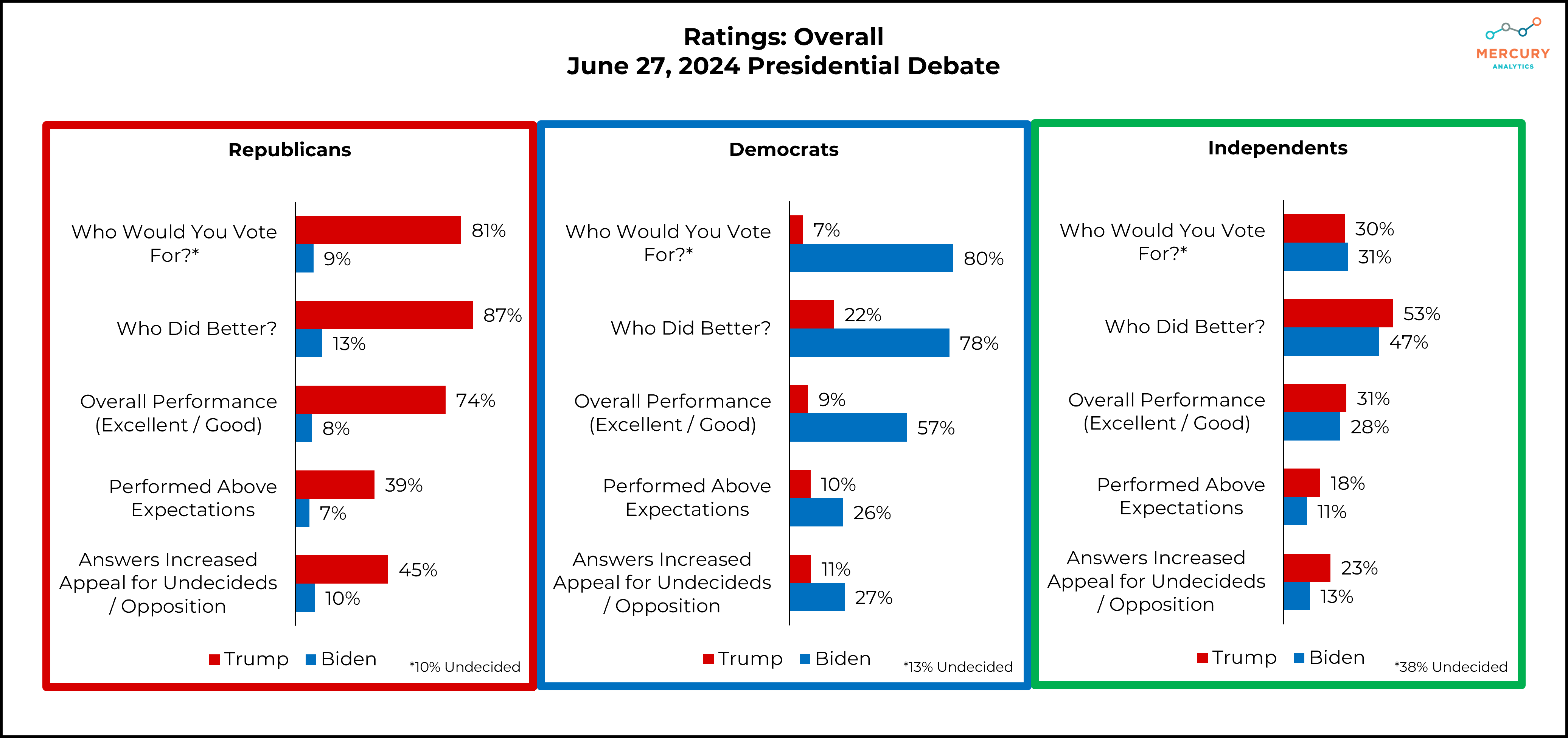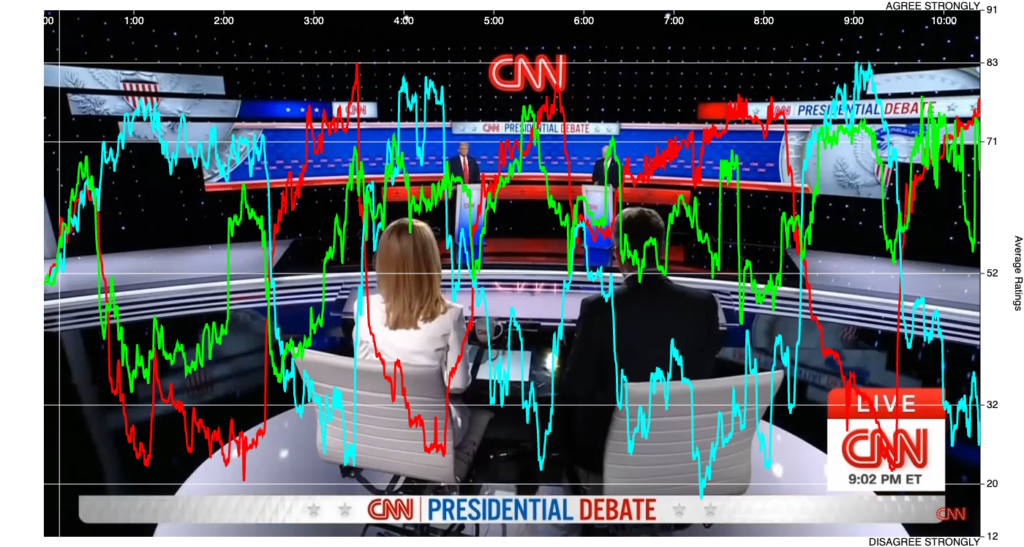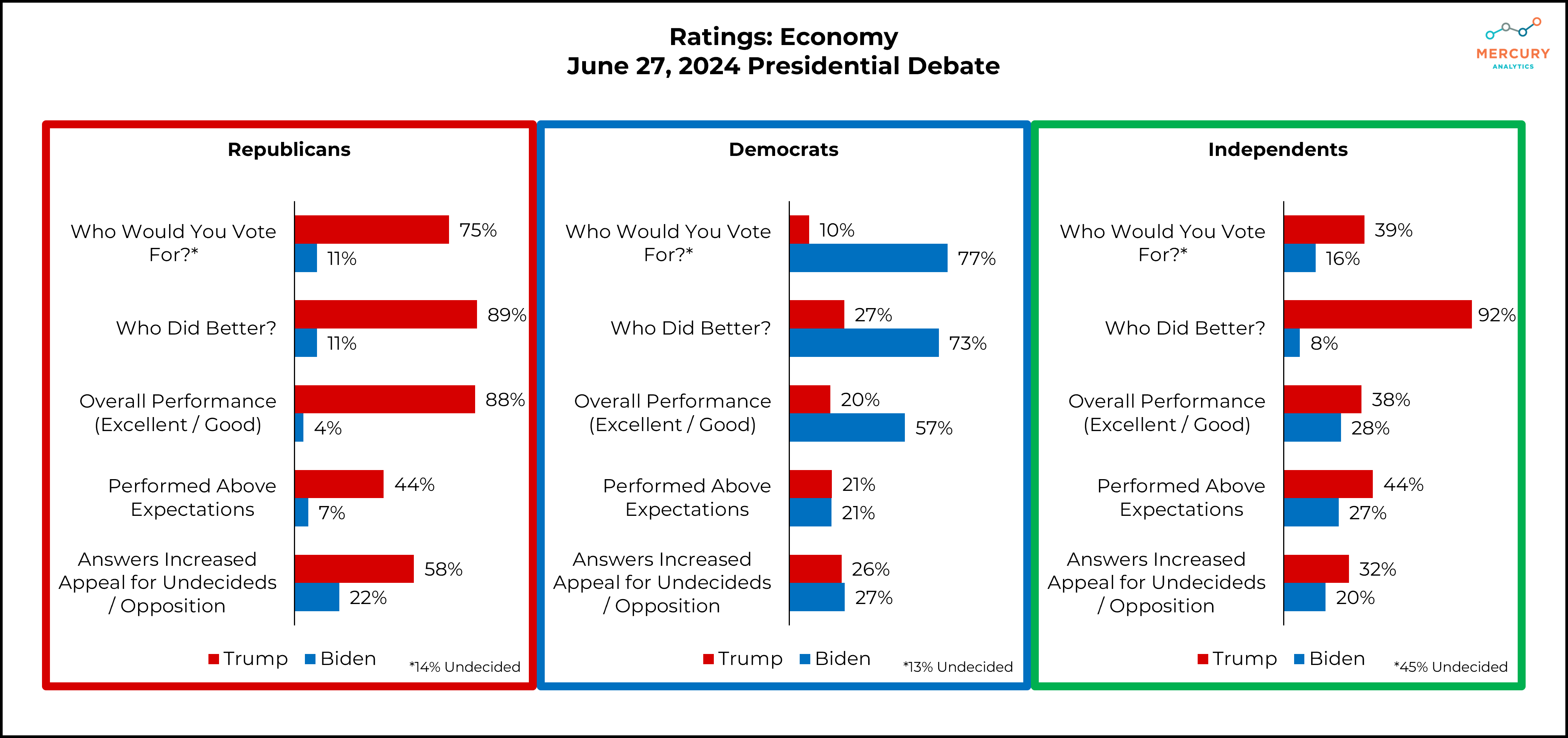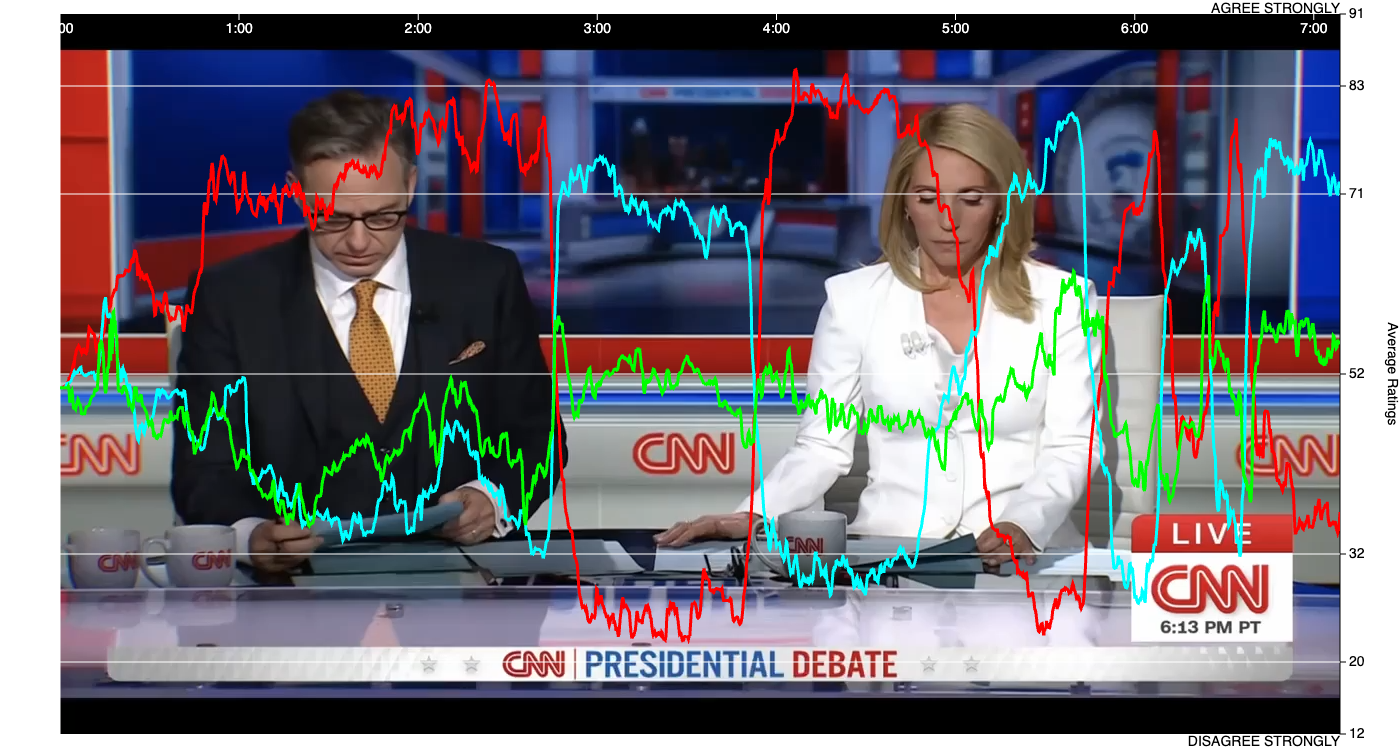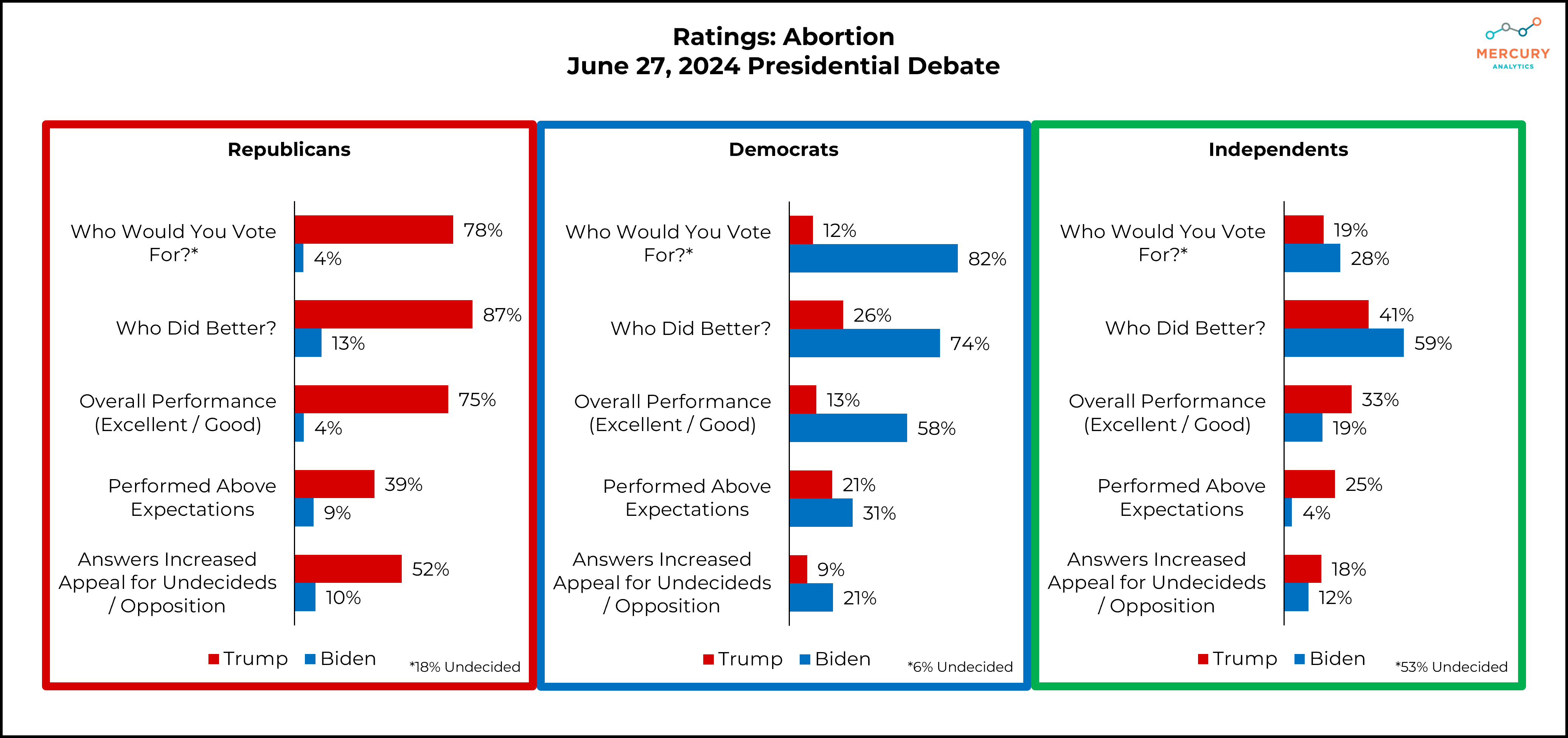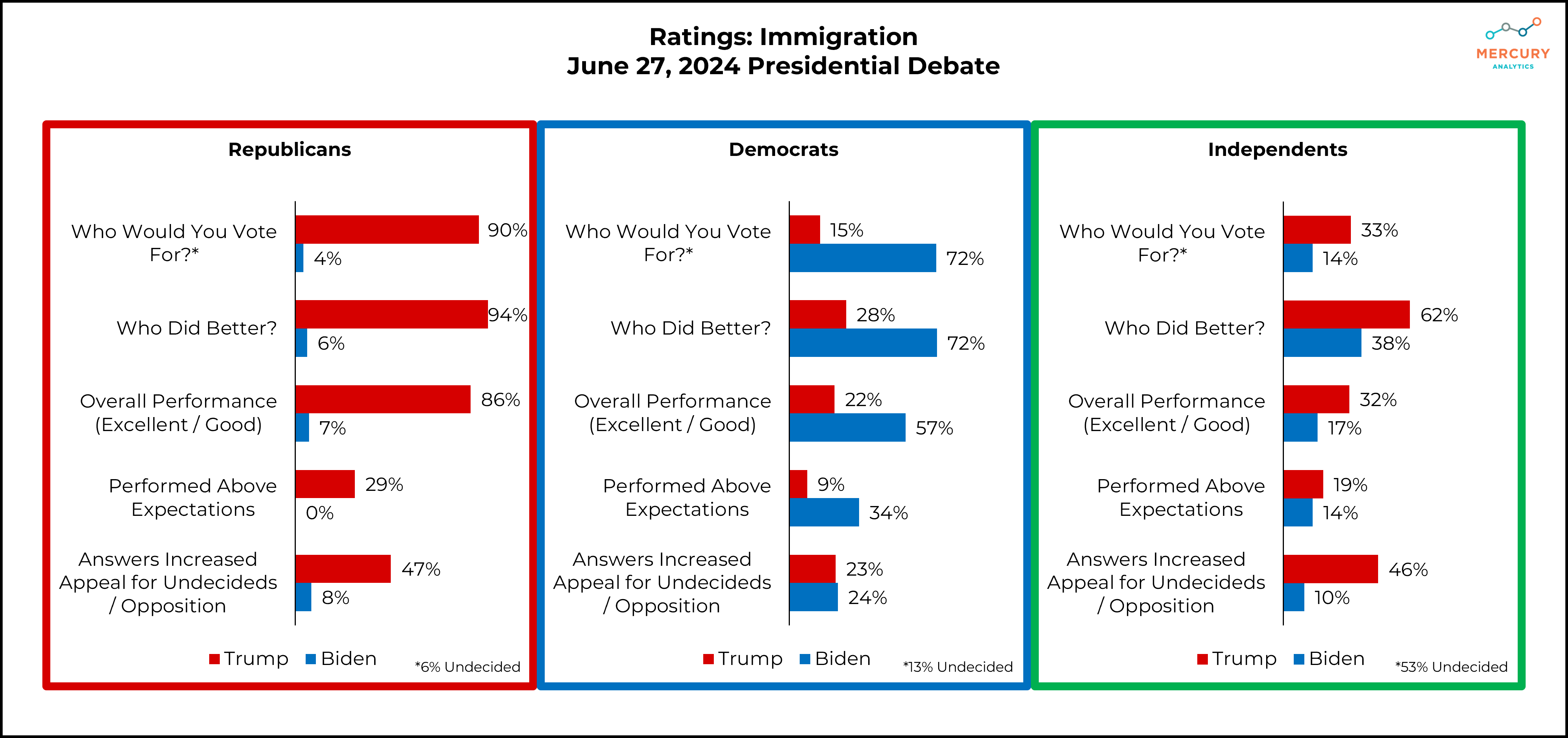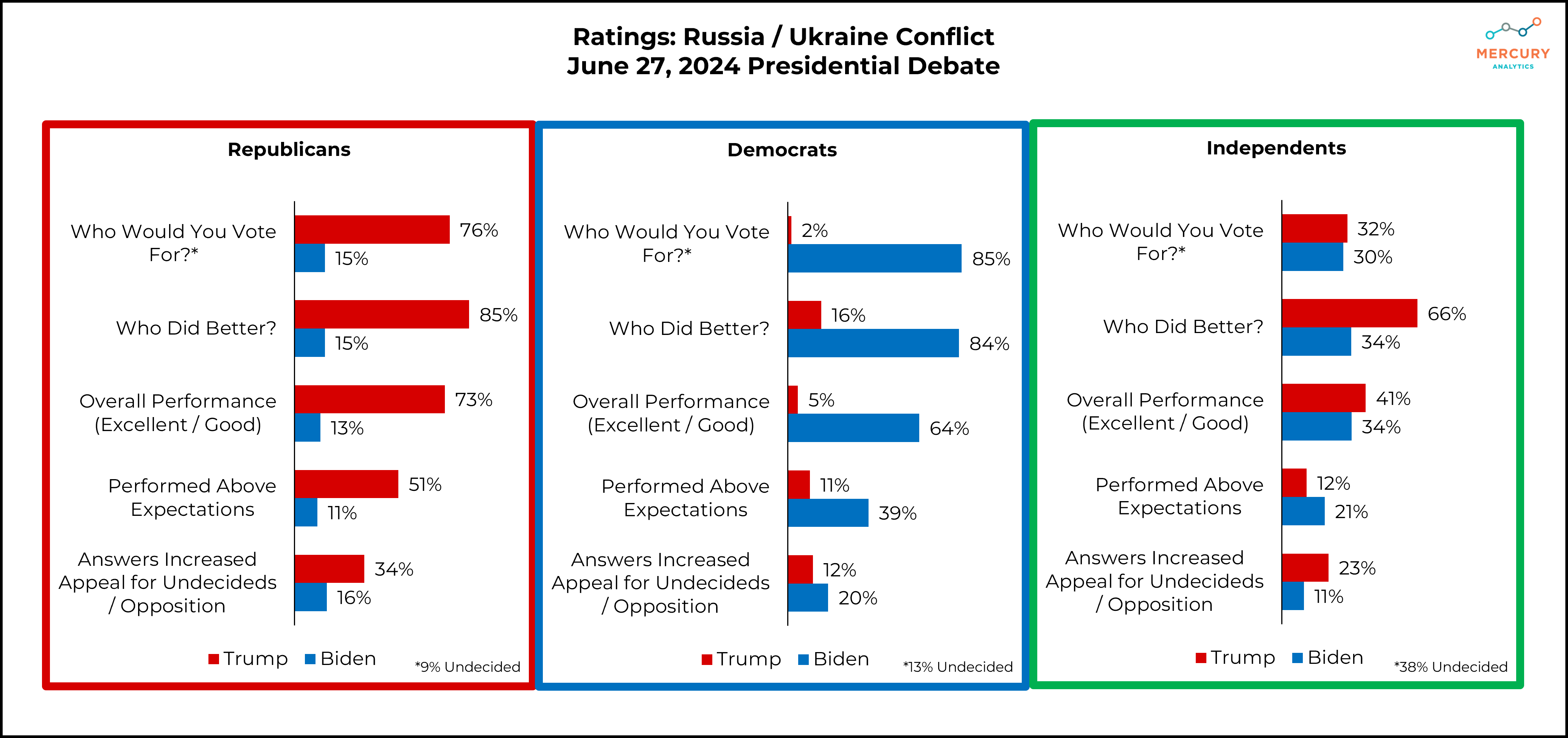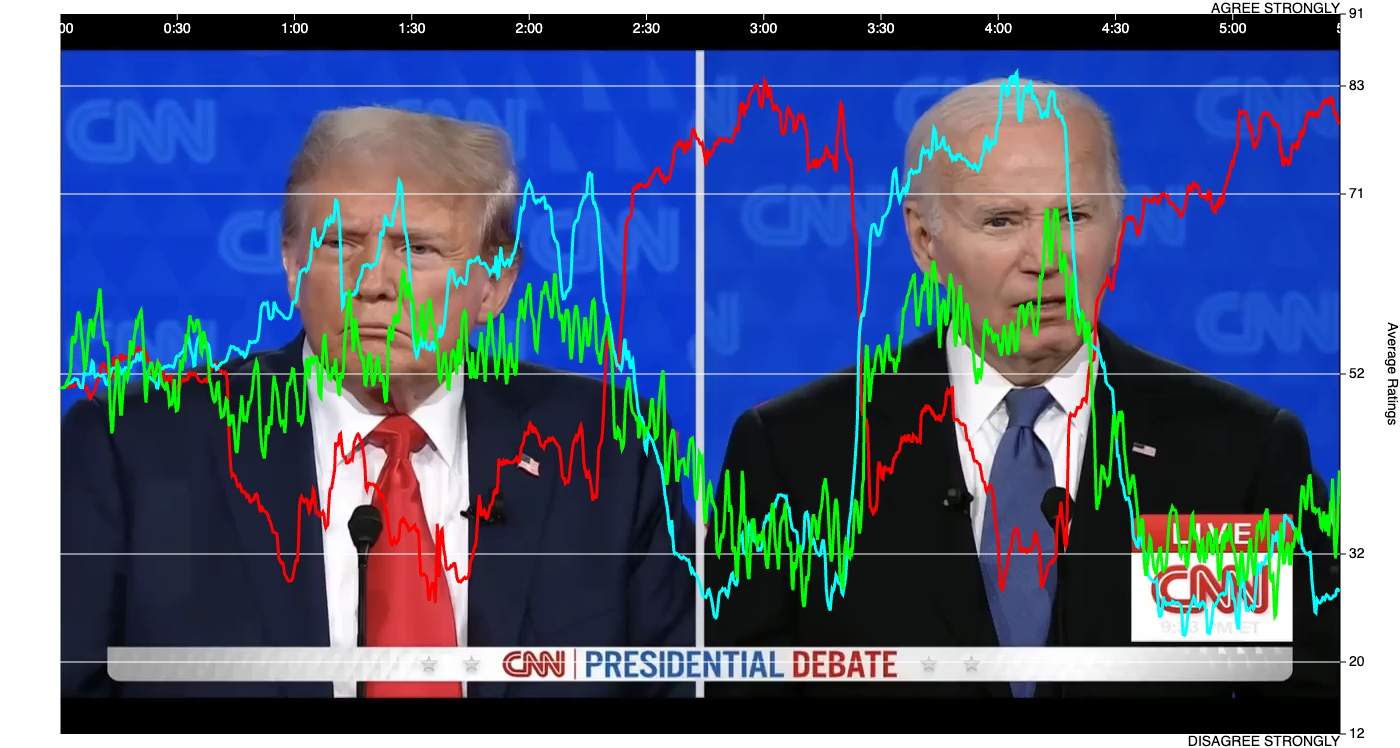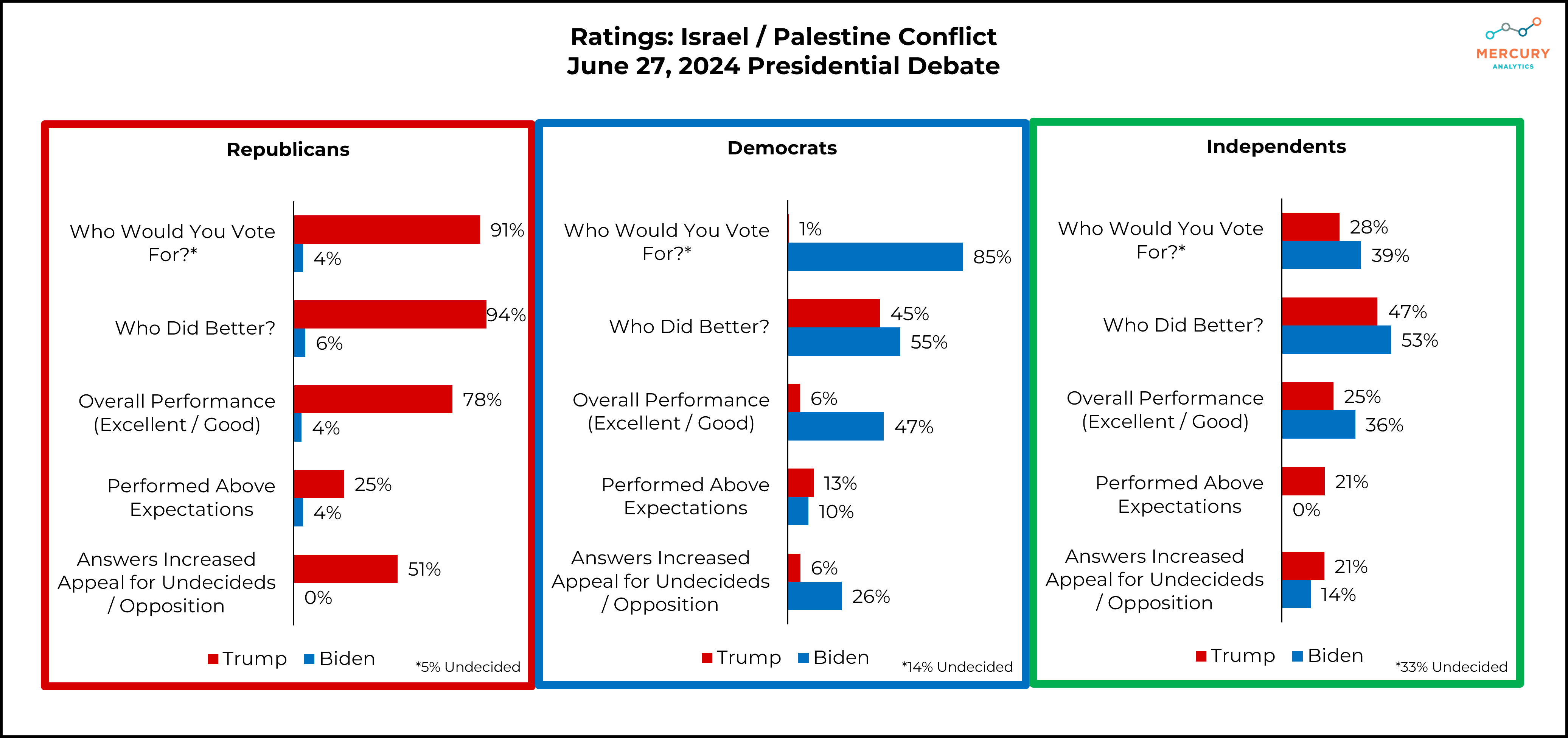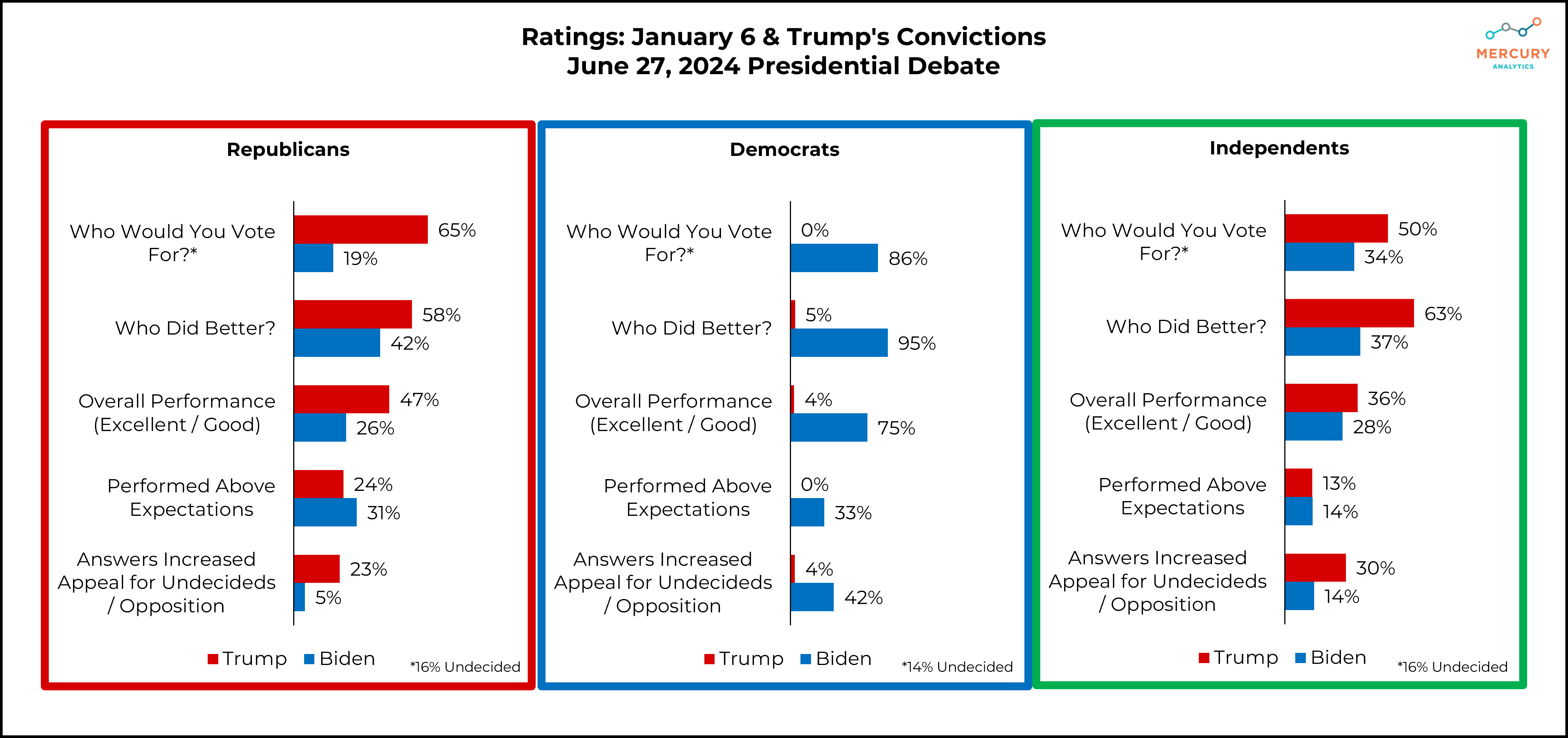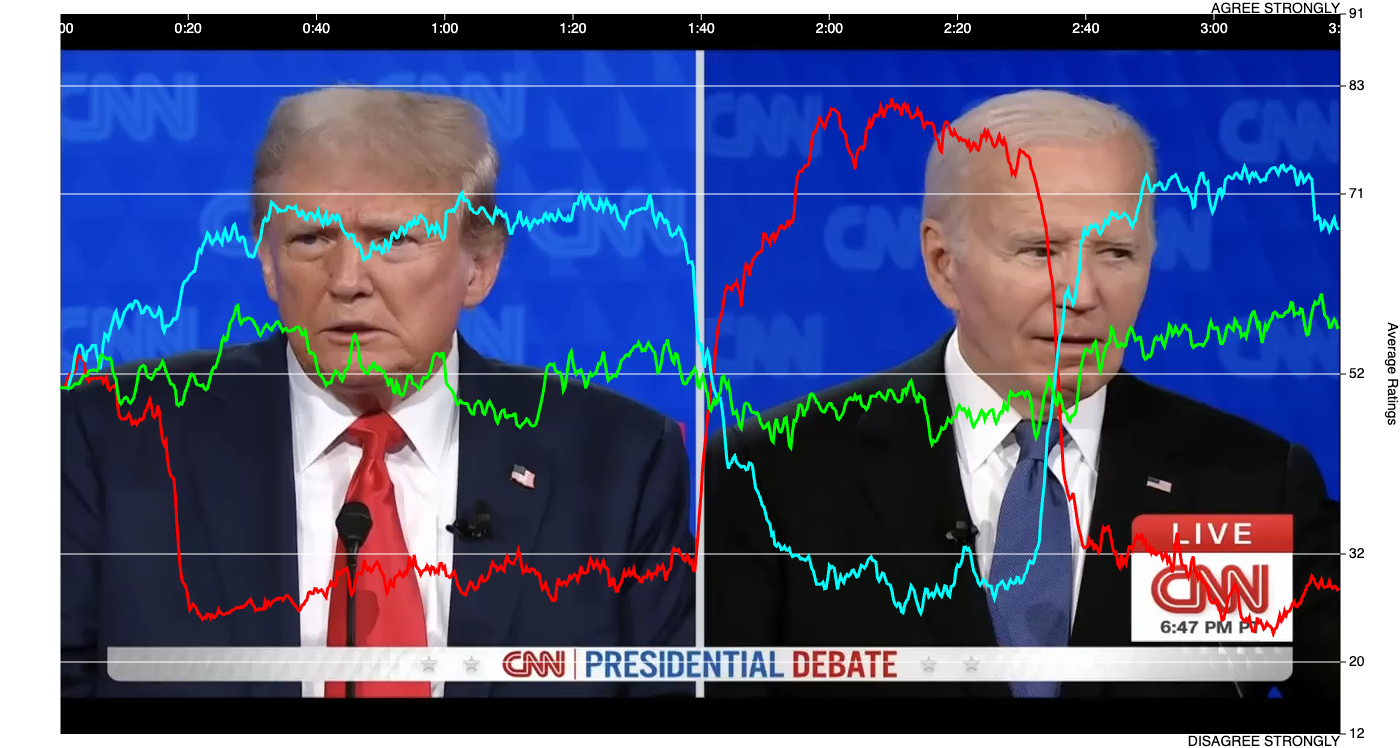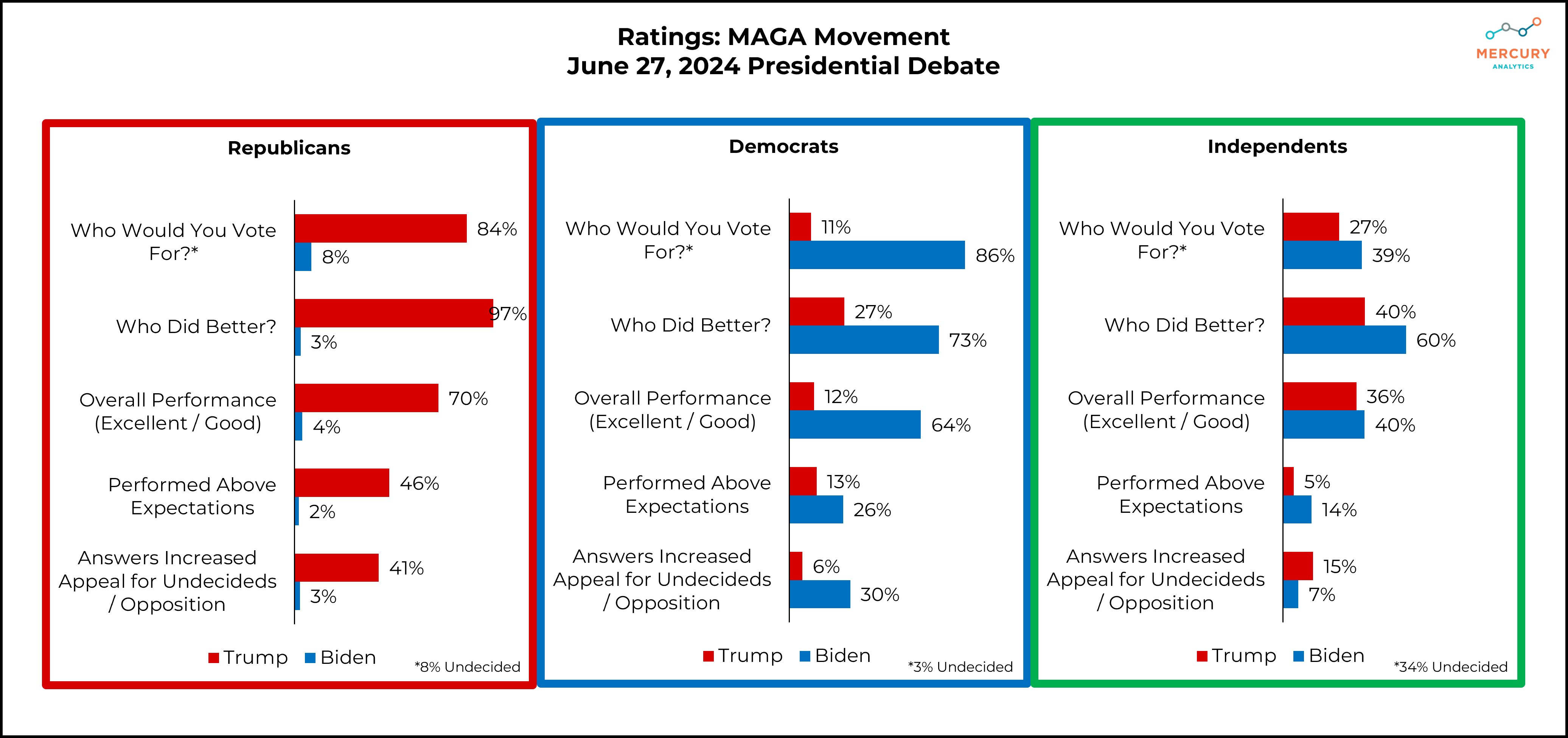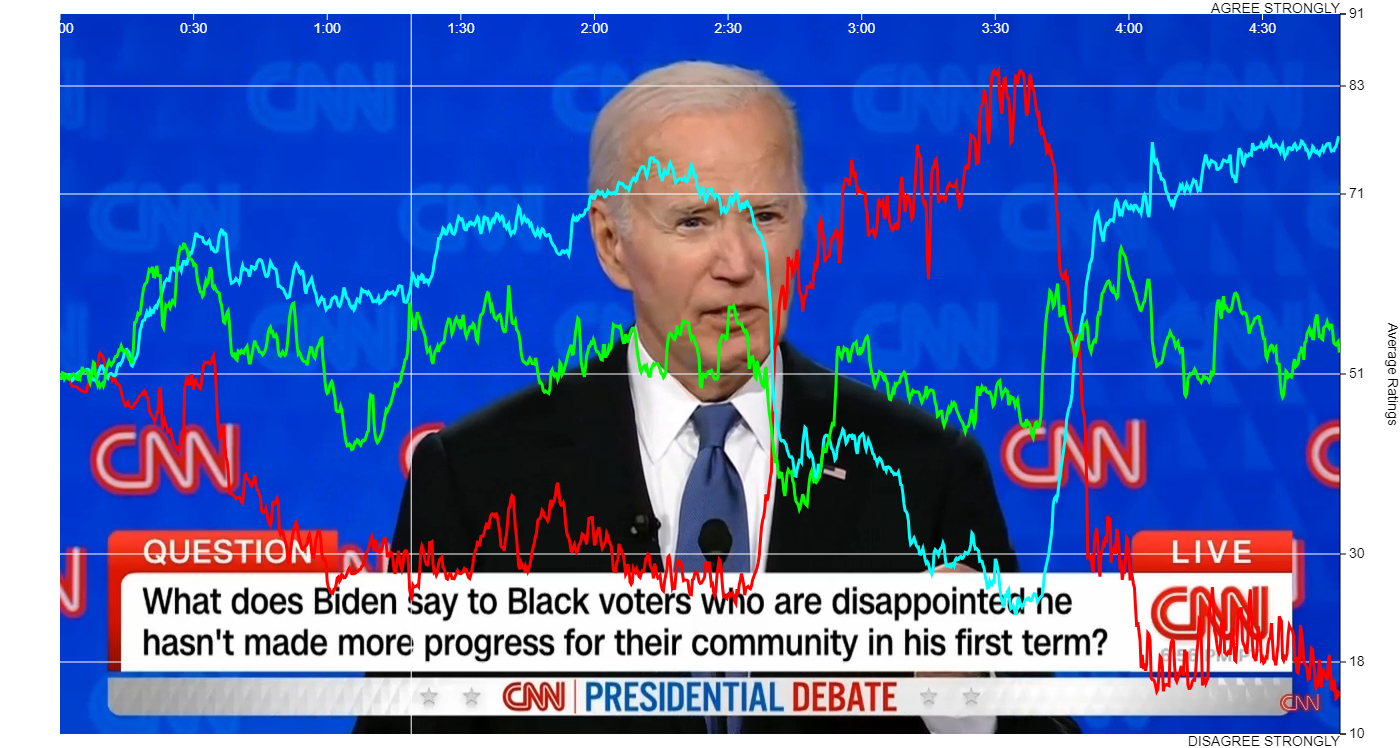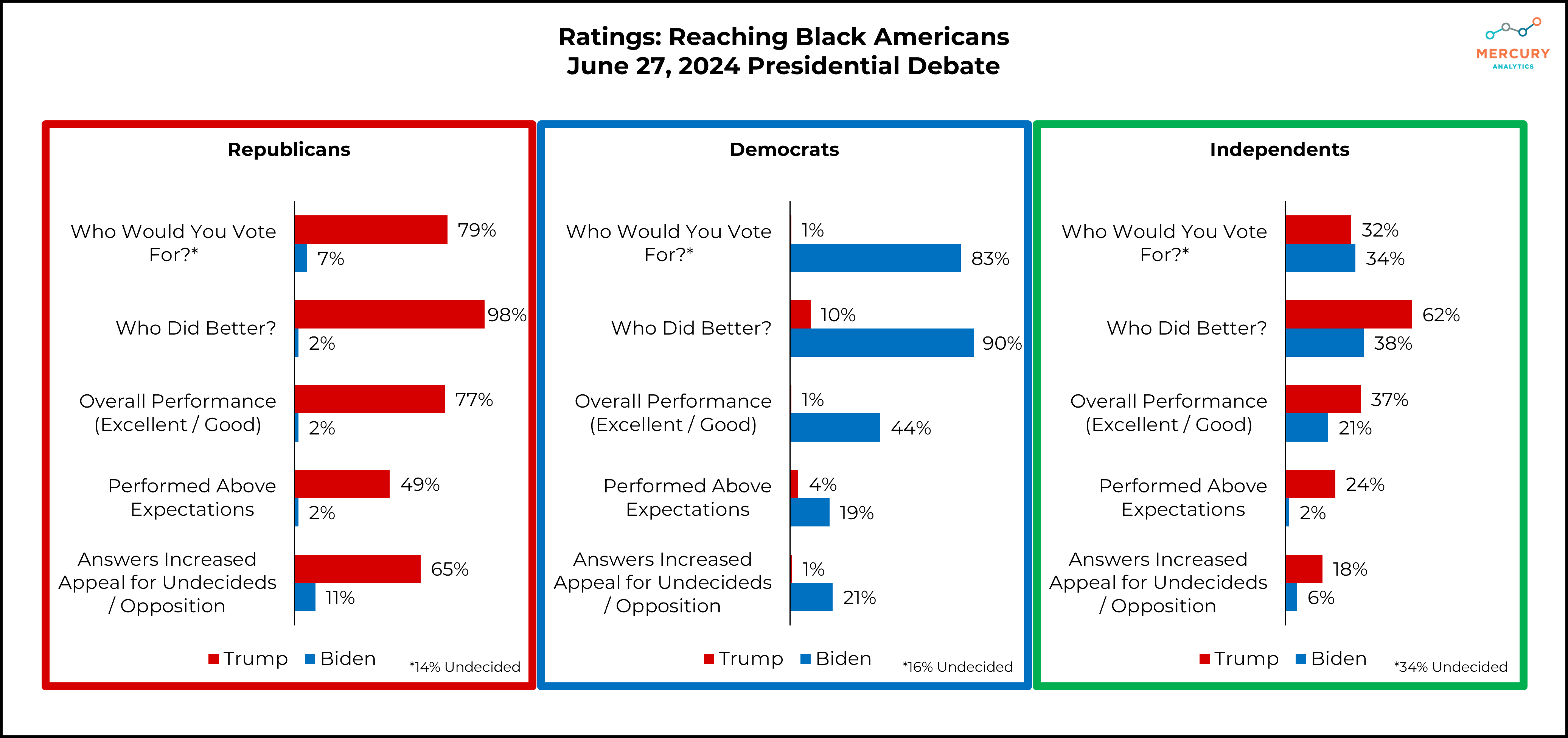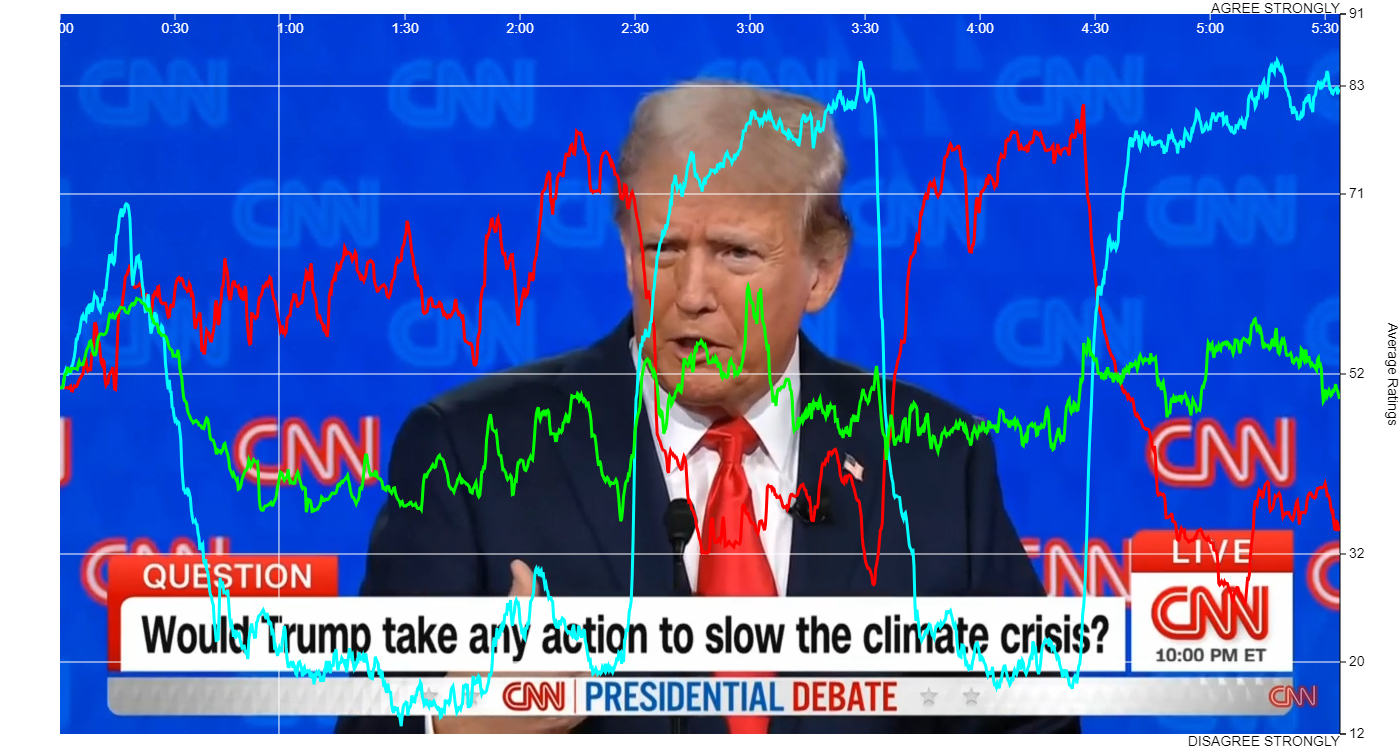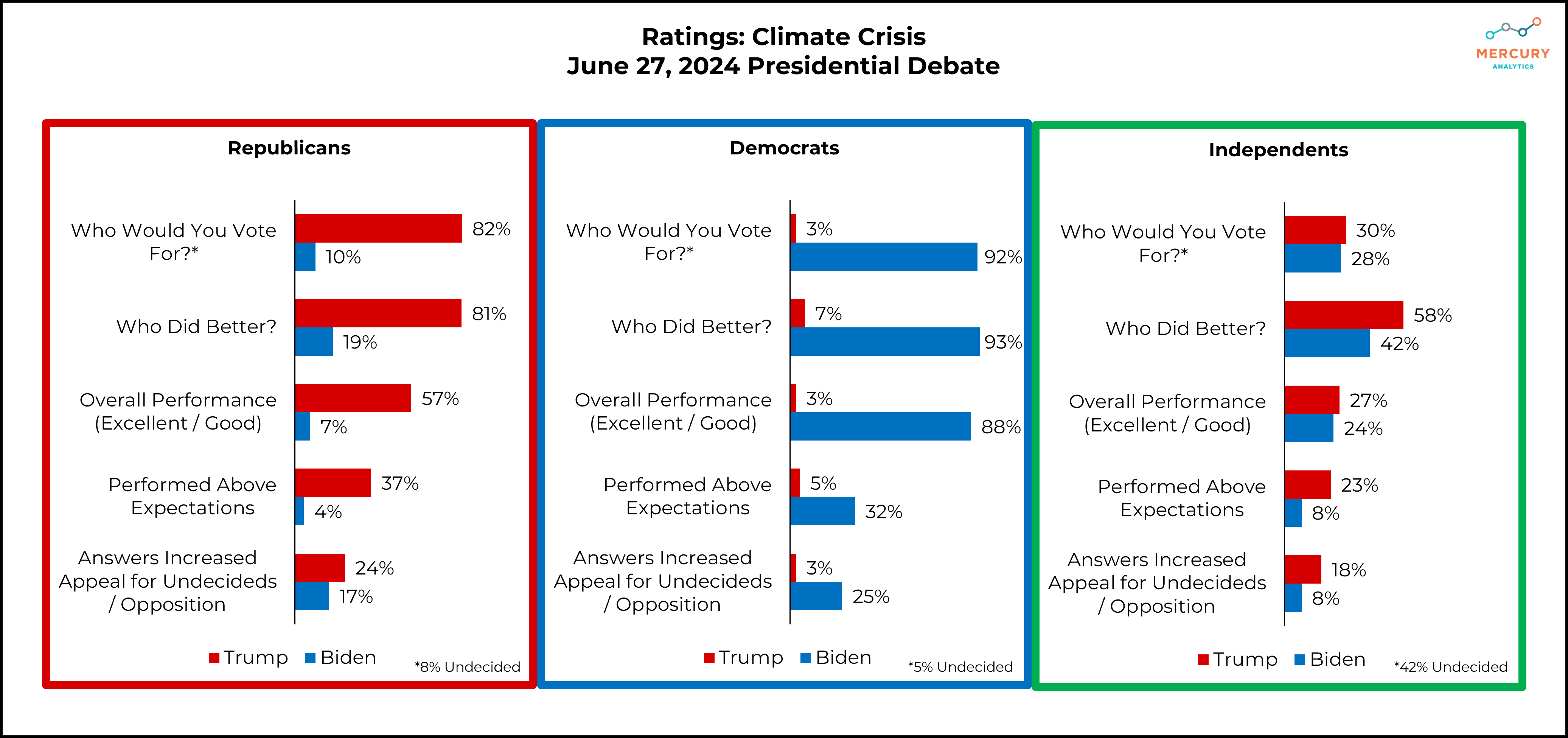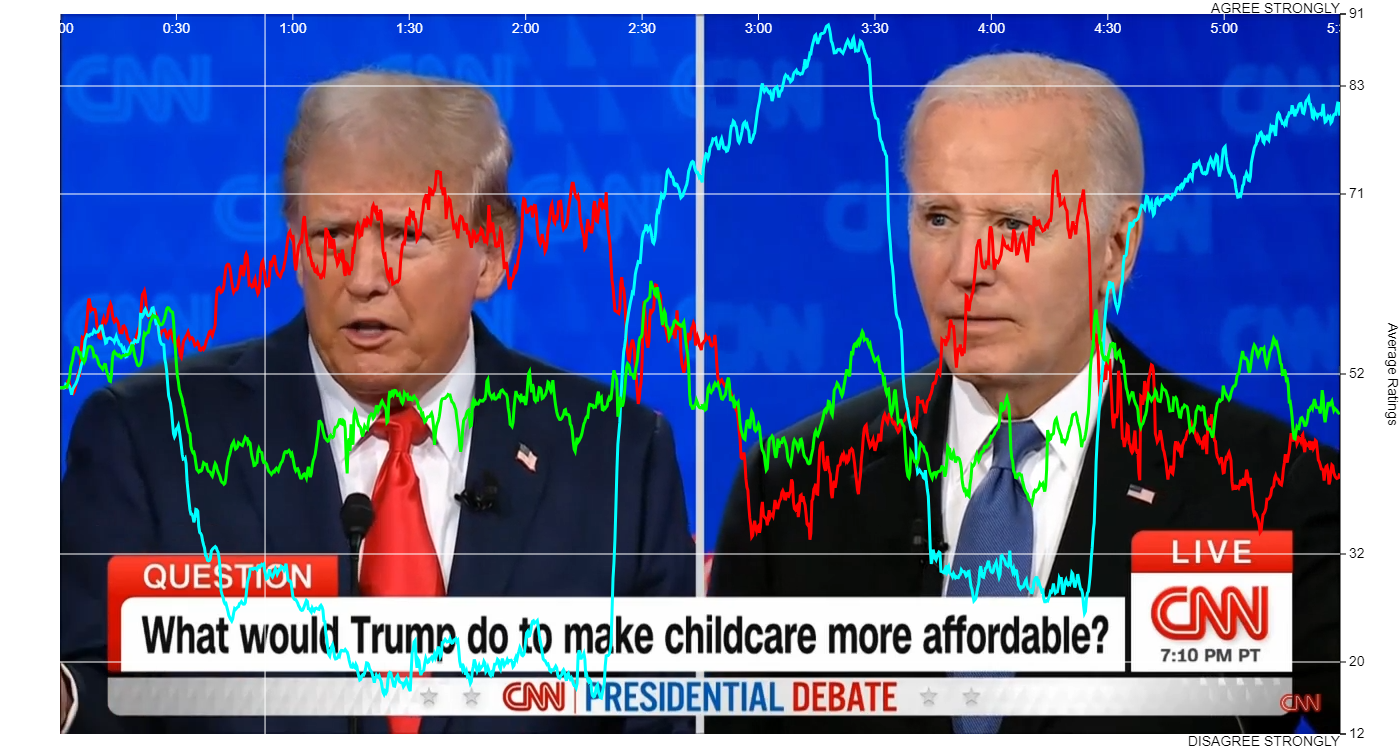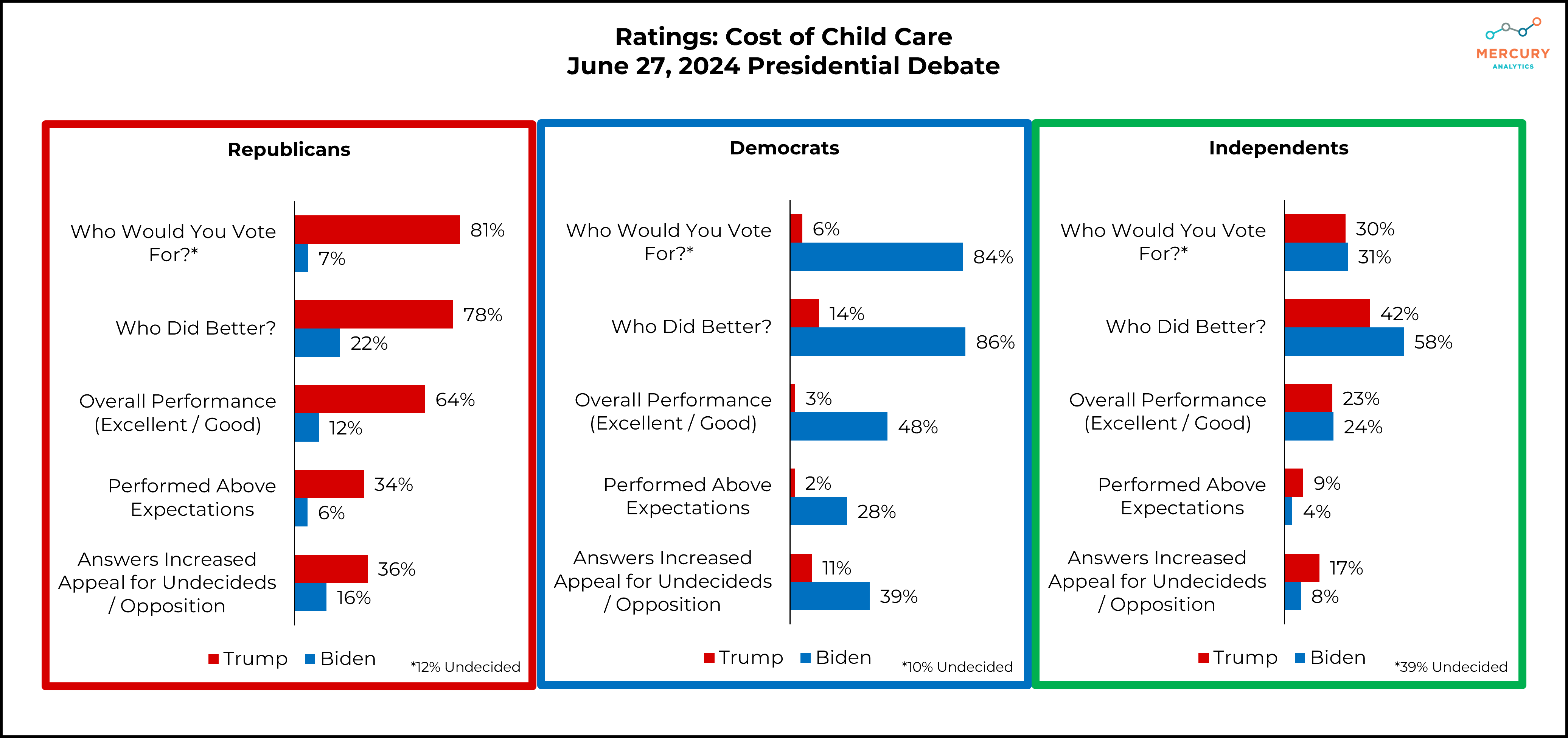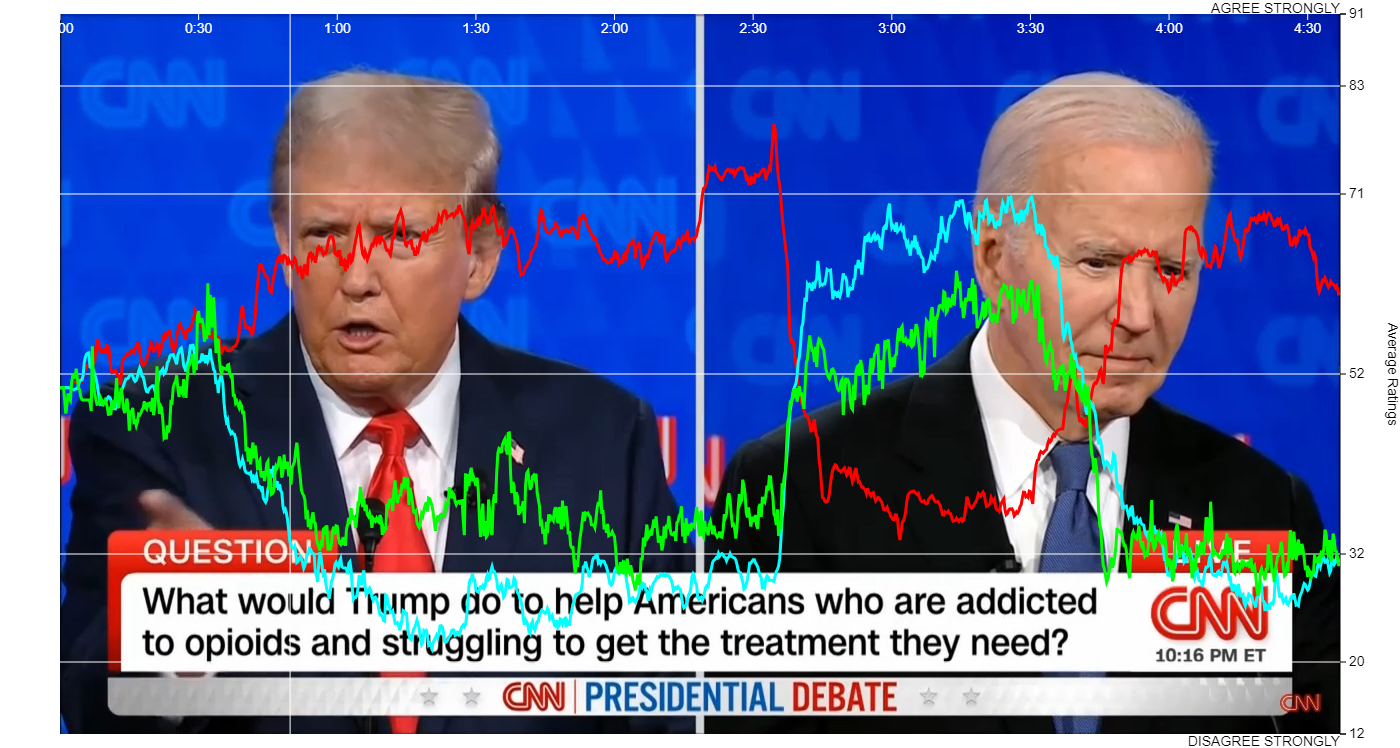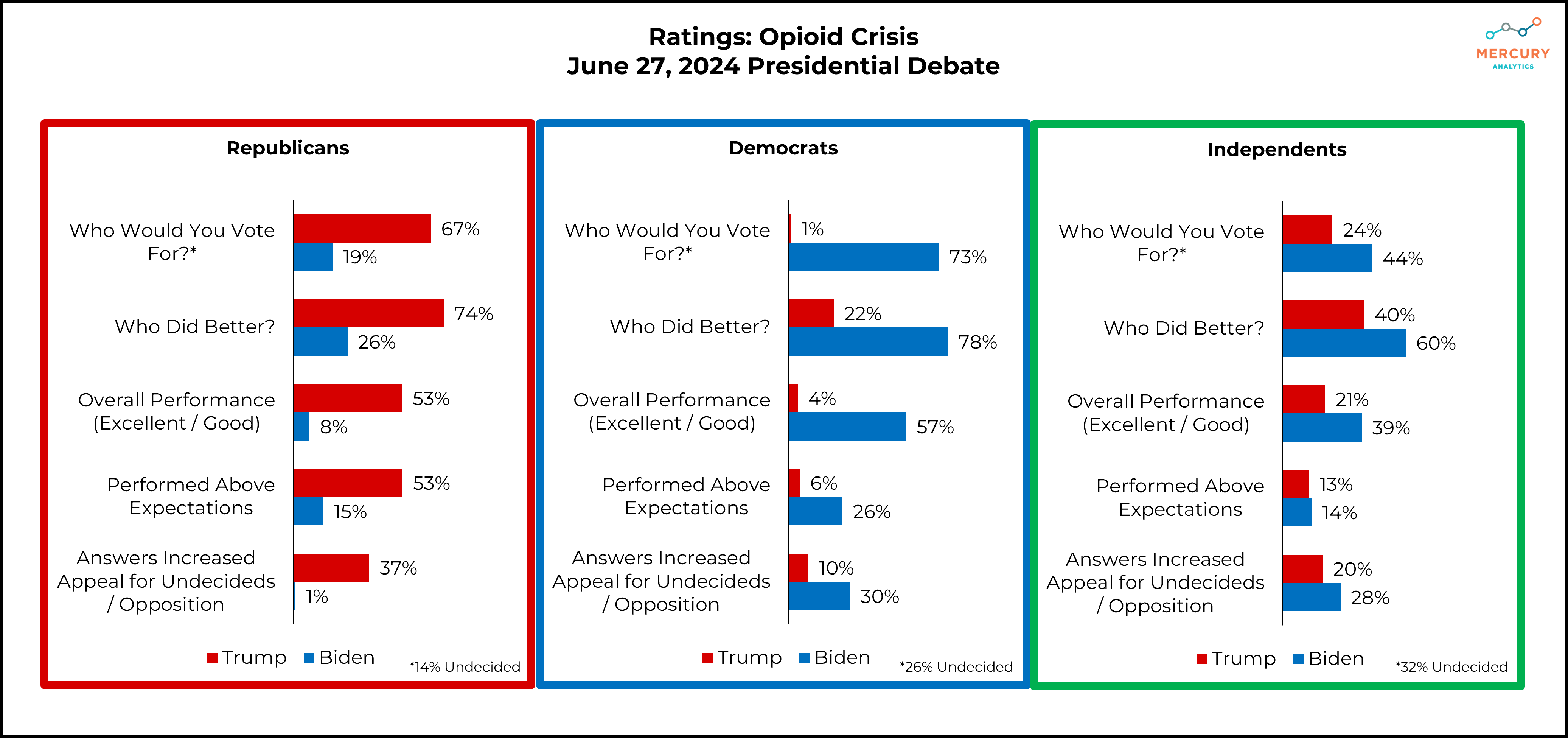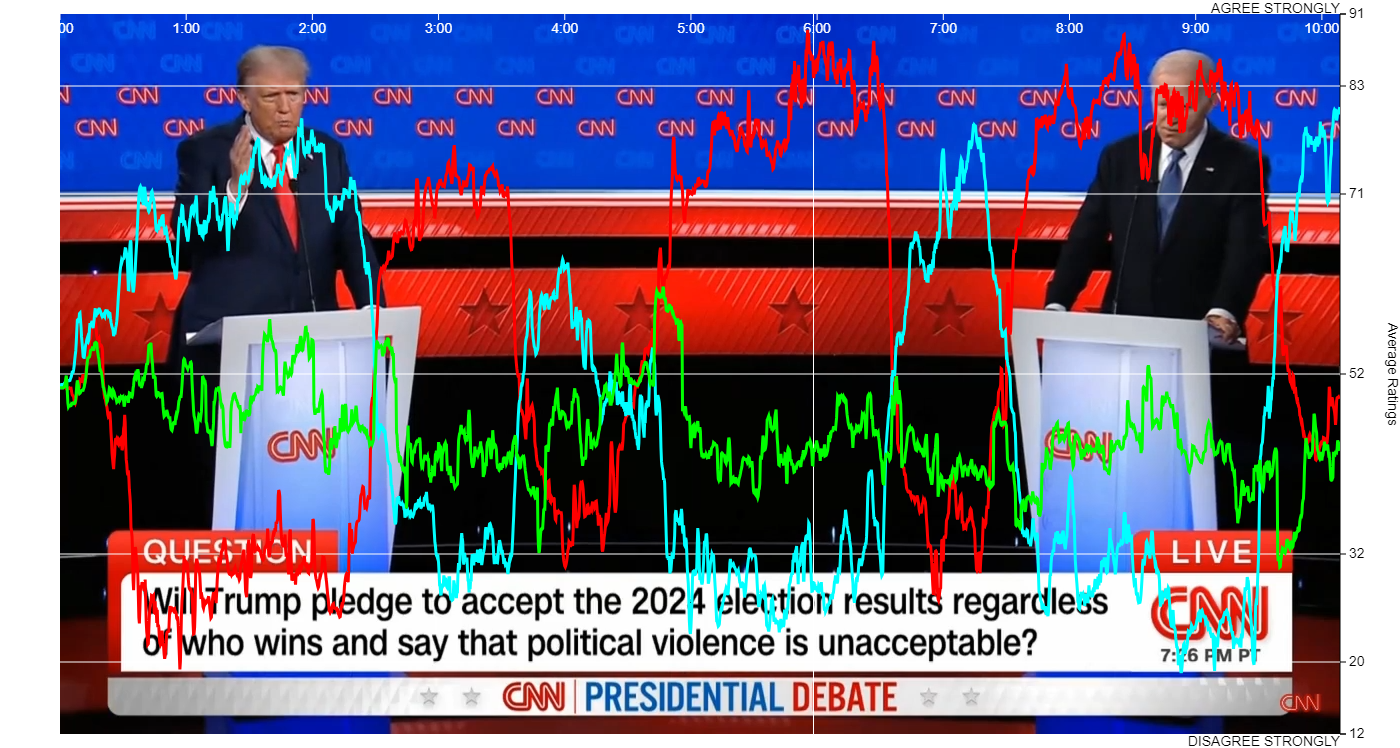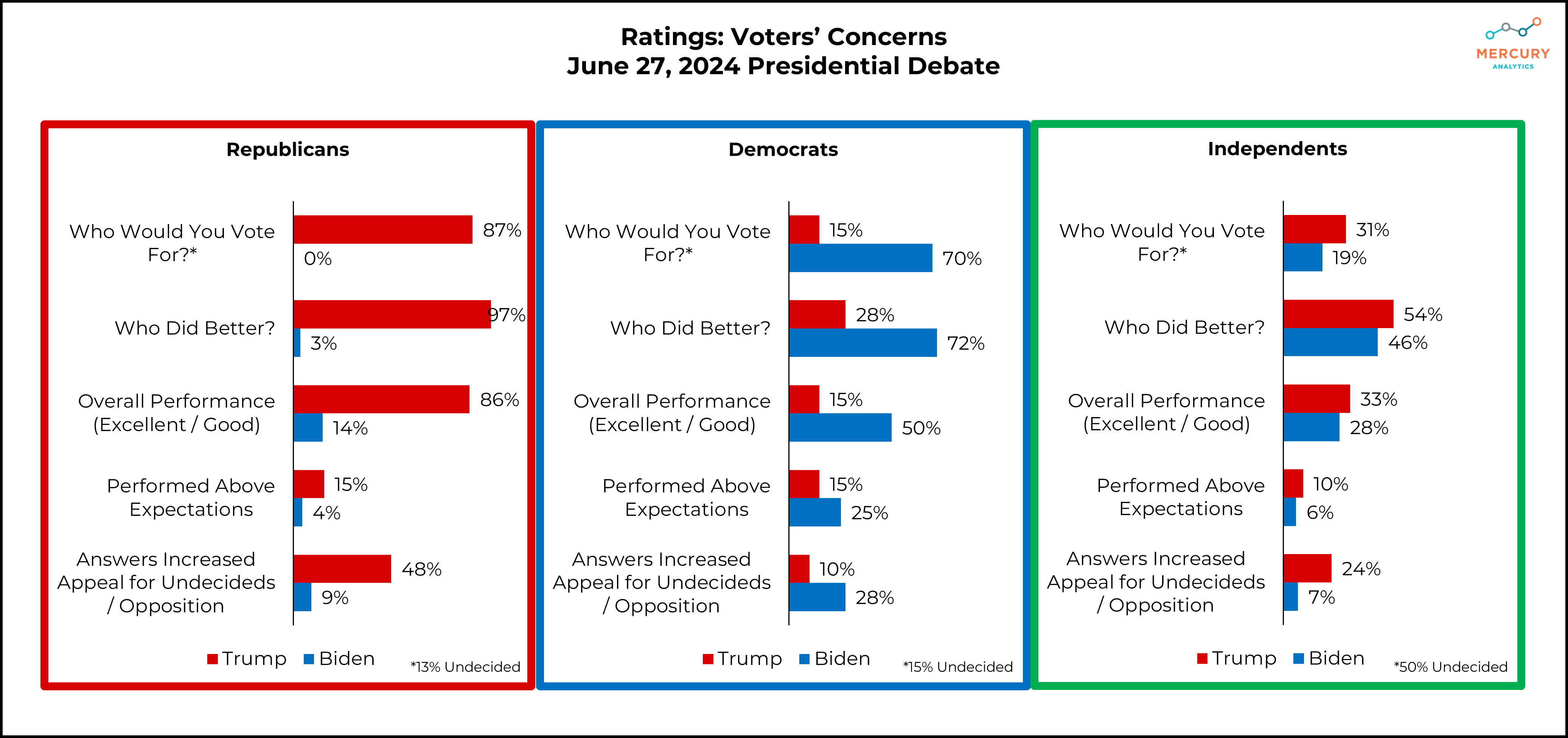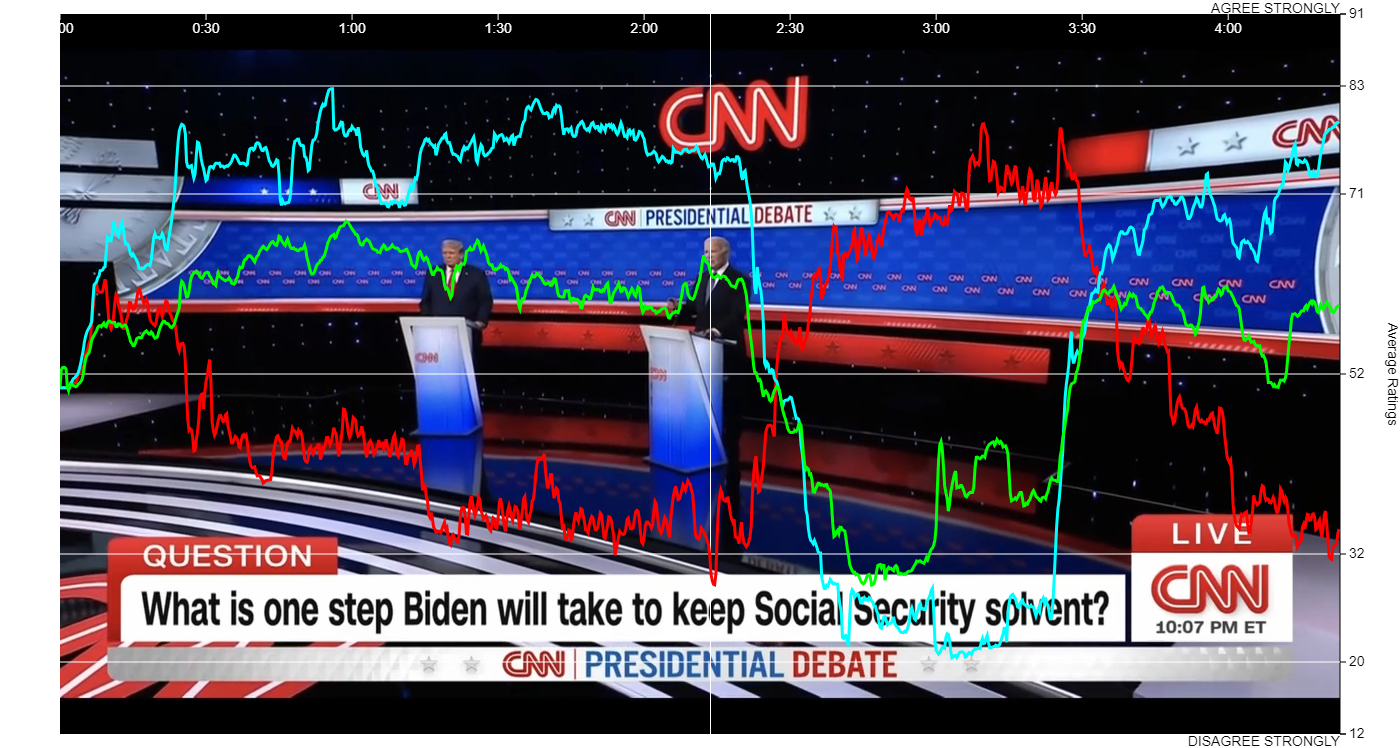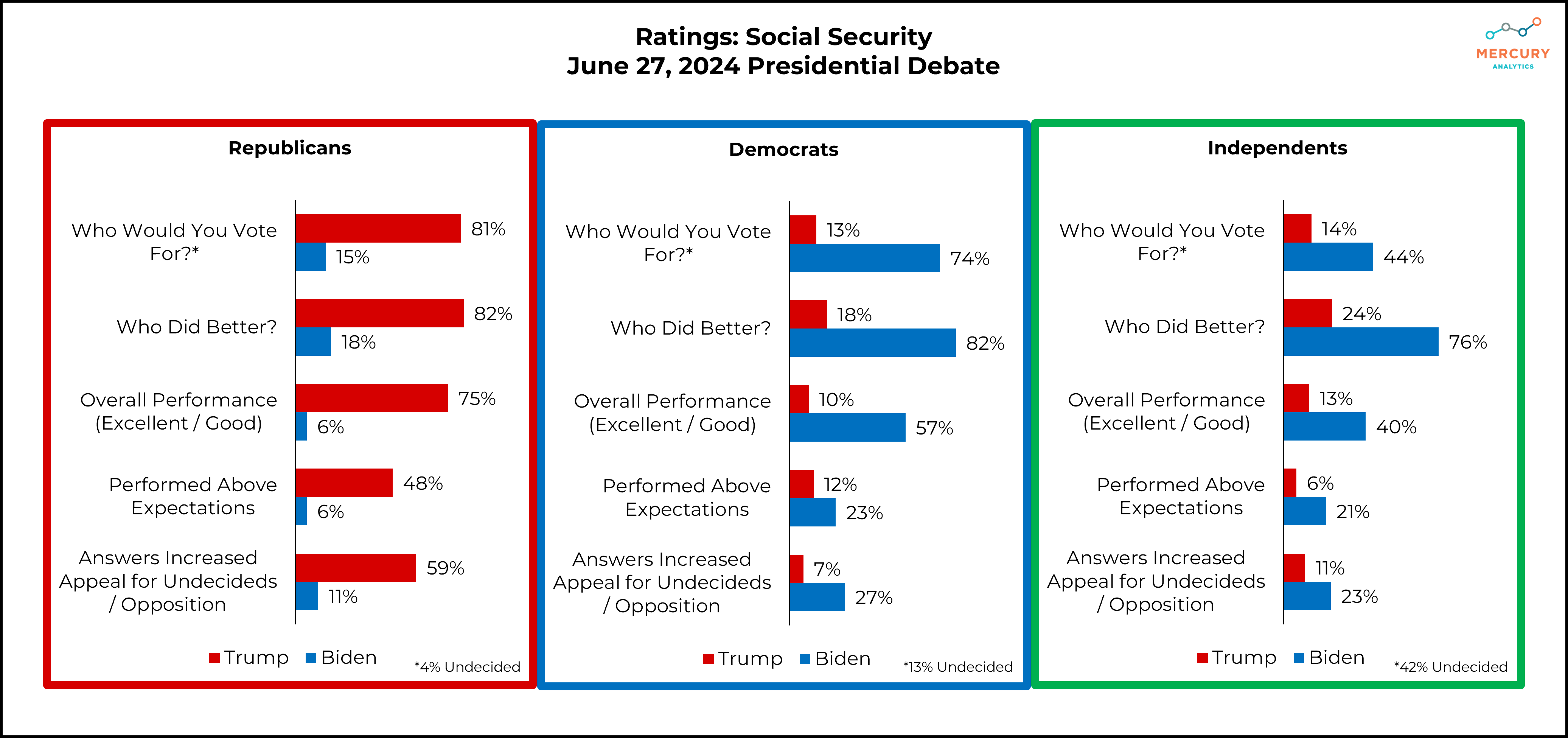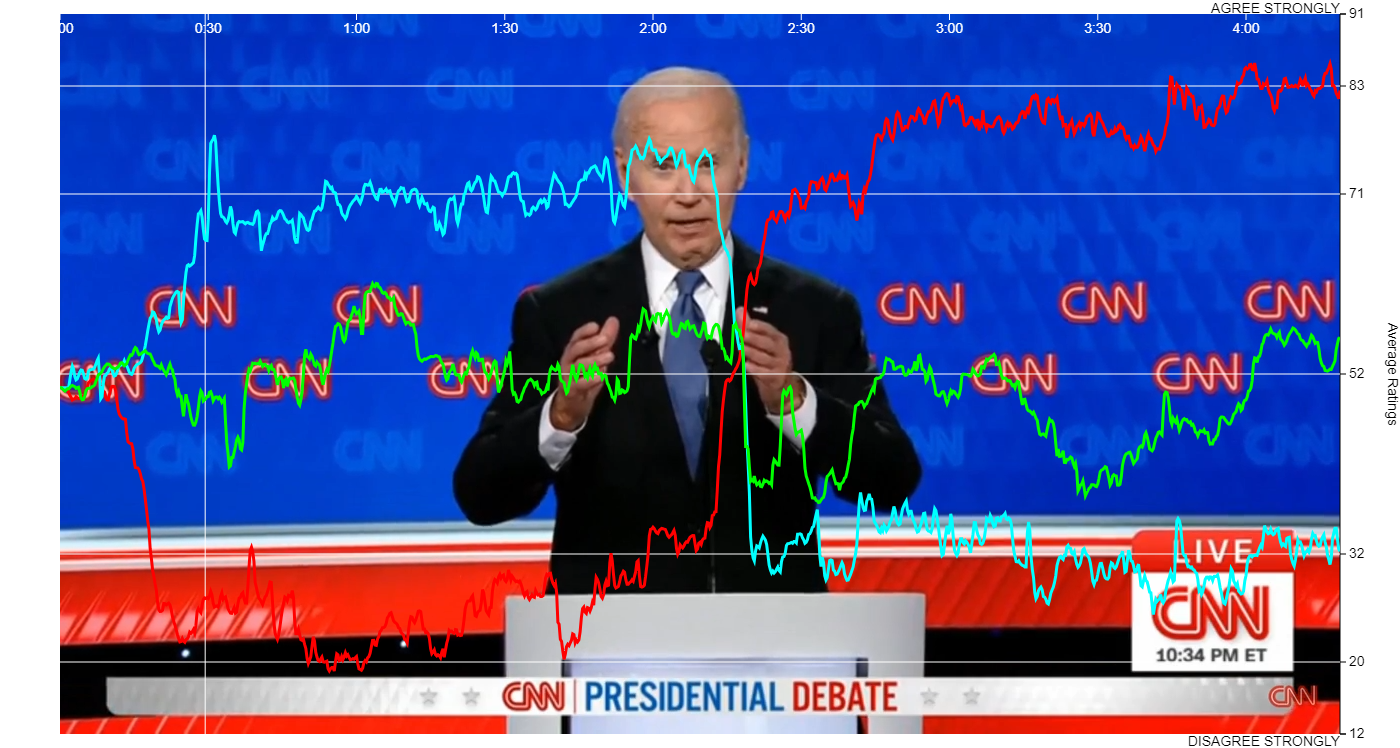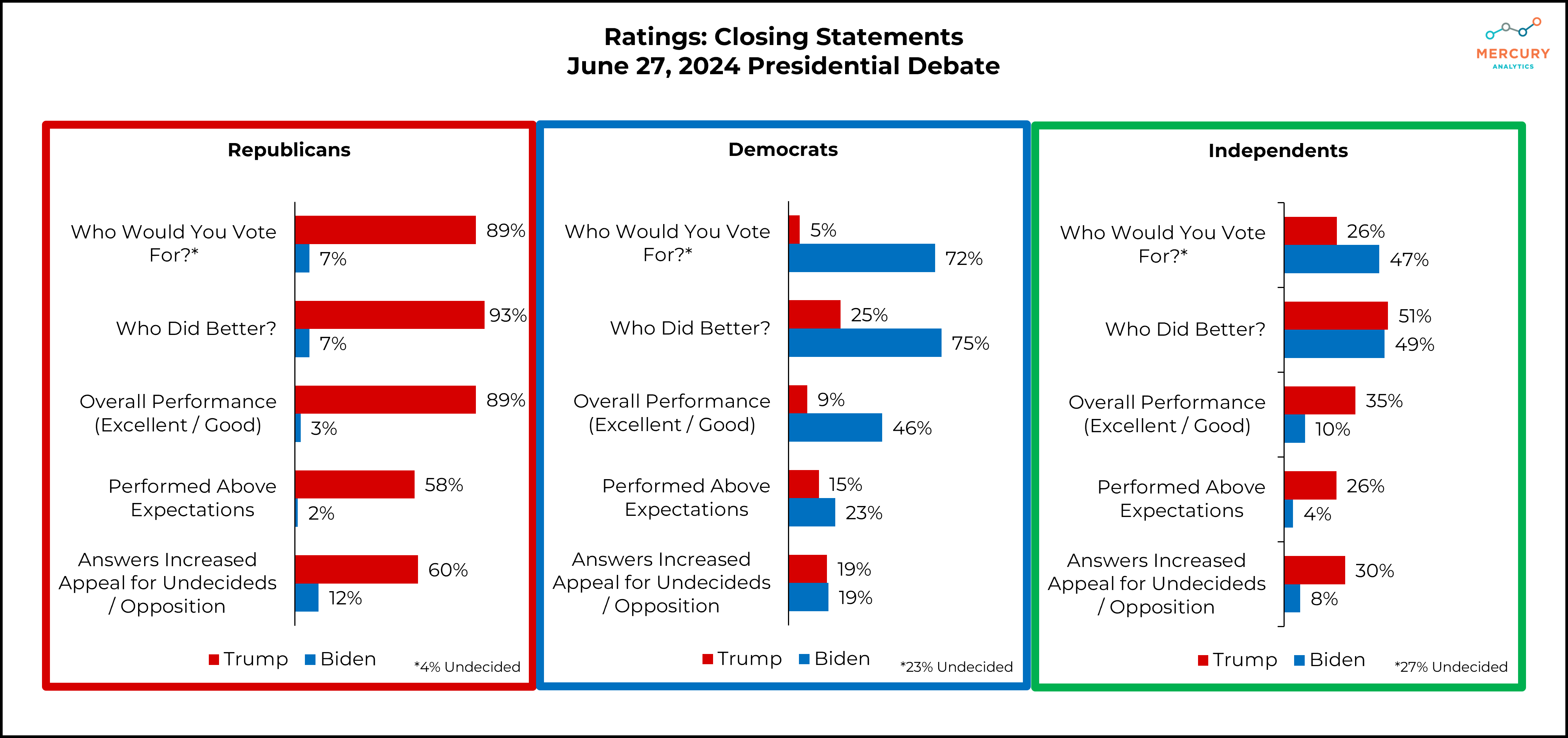2024 First Presidential Debate
Overnight National Research Among 2404 Likely Voters
On June 27th, 2024, the first presidential debate took place at CNN’s Atlanta Studios.
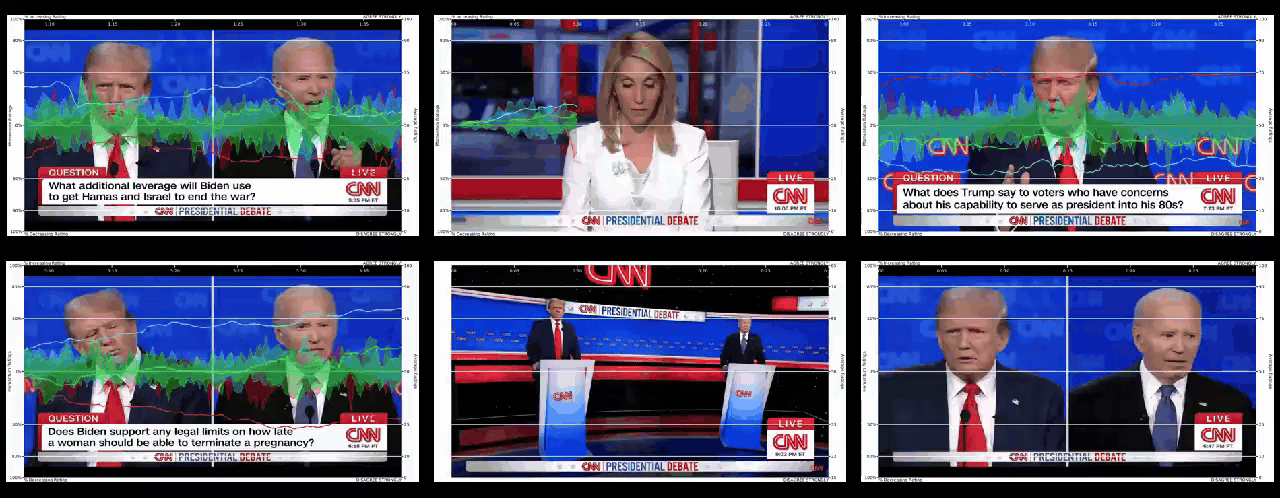
THE SETTING
Mercury Analytics conducted an overnight survey including dial-tests of the presidential debate between President Joe Biden and former President Donald Trump, which took place on June 27th, 2024 at CNN’s Atlanta studios.
This debate format departs from previous debates in many ways. The candidates forwent opening statements and went straight into questions, with 2 minutes allotted for responses and 1 minute for rebuttals. At the end, the candidates were given 2 minutes for brief closing statements. Additionally, in contrast to prior debates, last night’s debate was not filmed in front of a live audience and featured two commercial breaks (during which candidates were not allowed to interact with their staff).
Both candidates agreed to mute their microphones unless they were directed to speak and were not allowed to bring prewritten notes or props, though they were given a water bottle, pen, and paper. Biden chose the podium to the viewer’s right and Trump gave the final closing statement.
The debate started at 9:00 p.m. EST and consisted of 14 segments dedicated to various topics affecting the US. Jake Tapper and Dana Bash of CNN moderated the presidential debate, and selected the following topics: the economy, women’s rights, immigration, the Middle East, the state of democracy, MAGA, persistent challenges facing the US, the climate crisis, social security, cost of childcare, the opioid crisis, and individual concerns about each candidate.
Mercury’s study tested the candidates’ performance among a national sample of n=2404 likely voters. Respondents were first asked a series of demographic questions followed by questions to help understand respondents’ current views on politics in America, and specifically regarding President Joe Biden and former President Trump. Respondents who had watched the debate live (n975) were directed to a quick poll gauging their reactions to the debate, while those who had not watched the debate live (n1429) participated in a dial test exercise in which they were shown a short clip from the debate and asked to provide moment-to-moment reactions.
As participants watched the video, they moved a slider just below the video to the right the more strongly they agreed with what they were seeing and hearing, or to the left the more strongly they disagreed with the candidate. They also had the option to push a button that would identify a “GREAT MOMENT” or a moment when they felt “THAT’S NOT TRUE”.
Before the close of the survey, respondents were asked post-exposure questions to assess their reactions to both candidates’ performance in the debate.
For more information on Mercury’s dial-testing, click here, and for more technical information about the study, please contact Jordan Kraft or at 202-386-6322 x 322.
ANALYSIS OF REACTIONS TO DEBATE SEGMENTS
Fielded Among n1429 Likely Voters Who Watched and Dial-Tested a Debate Segment
POWERED BY MERCURYAI
Overview
The primary purpose of this research study was to gain a comprehensive understanding of likely voters’ perceptions of the presidential debate that occurred on June 27th, 2024, and associated viewpoints. A total of 1,429 respondents were surveyed. The study utilized MercuryAI to analyze qualitative responses, providing a nuanced interpretation of different political party members’ opinions and sentiments about the debate.
The audience segments analyzed in this report include self-identified Republicans, Independents/Other, and Democrats. The survey aimed to elucidate how each group perceived the performances of the presidential candidates, Donald Trump and Joe Biden, and how these perceptions might influence their voting intentions.
Key Findings and Analysis
Political Self-Identification and Voting Intentions
When asked about their political affiliation, 11% of participants identified as “Strong Republican”, 17% as “Lean More Republican”, 30% as “Independent”, 21% as “Lean More Democrat”, 19% as “Strong Democrat”, and 1% as “Other”. These statistics reflect a diverse political landscape with a significant proportion of Independents.
Regarding voting intentions, 35% of participants indicated they would vote for Donald Trump (Definitely/Very/Somewhat Likely), while 32% would vote for Joe Biden (Definitely/Very/Somewhat Likely), showing a polarization in voter support. Interestingly, 8% of participants were unsure, indicating a small but potentially influential group of undecided voters.
Perceptions of Debate Performances
Donald Trump
Trump’s performance in the debate elicited mixed reactions. The Top-2-Box score (Excellent/Good) for Trump was 34%, while the Bottom-2-Box score (Not Good/Terrible) was 47%. This indicates that while a substantial portion of the audience viewed Trump’s performance favorably, an even larger group was critical.
MercuryAI analysis of Republicans revealed that Trump’s firm stance on immigration and border security was a key point of admiration. They applauded his direct communication style, viewing it as a commitment to transparency. Trump’s economic policies, particularly tax cuts and deregulation, were also praised for contributing to economic growth and job creation.
However, Democrats and Independents criticized Trump’s frequent deviations from questions, his lack of substantive policy discussions, and his tendency to engage in personal attacks. His handling of the COVID-19 pandemic and perceived dishonesty were also significant points of contention. While some Independents admired Trump’s confidence and assertive delivery, others felt that his rhetoric often lacked factual support and was divisive.
Joe Biden
Joe Biden’s performance also drew varied opinions. The Top-2-Box score for Biden was 34%, mirroring Trump’s rating closely. However, his Bottom-2-Box score was slightly lower at 37%, suggesting marginally more favorable overall perceptions compared to Trump.
MercuryAI analysis indicated that Republicans predominantly criticized Biden for perceived cognitive decline, lack of coherent speech, and handling of the economy. They questioned his honesty and his reliance on prepared scripts, viewing these as detractions from his authenticity.
Independents were divided: some praised Biden’s focus on policy, factual accuracy, and his approach to addressing critical issues like childcare and taxation. Others, however, expressed concerns about his coherence, occasional speech disruptions, and his handling of pressing issues like immigration and the economy.
Democrats generally supported Biden, commending his emphasis on key issues affecting minorities, the middle class, and women’s rights. However, they also pointed out his occasional failures in articulation and staying on topic, which detracted from his otherwise policy-driven approach.
Comparative Performance and Expectations
When asked if Biden’s performance increased his appeal to undecided voters or Trump supporters, only 18% of respondents said “Yes,” while 47% said “No,” indicating limited cross-party influence. Similarly, 25% believed Trump’s performance increased his appeal to Biden supporters or undecided voters, with 40% disagreeing.
Regarding whether Trump performed above, as expected, or below expectations, 21% said he performed above expectations, 63% as expected, and 16% below expectations. For Biden, 16% felt he performed above expectations, 55% as expected, and 29% below expectations. These figures illustrate that both candidates largely met the established expectations of their supporters, with Biden having a higher proportion of those who felt he underperformed.
Emotional Reactions and Overall Sentiment
Participants’ emotional reactions to the debate were varied. Notably, 22% were worried that Biden might lose, while 6% were concerned that Trump might lose. A significant 25% stated the debate had little or no impact on them, and 21% found it nonsensical, indicating a level of disenchantment with the debate process.
Interestingly, 16% felt hopeful after watching the debate, underscoring a segment that sees positive potential regardless of partisan leanings. Conversely, 21% felt hopeless, reflecting deep-rooted concerns about the current political climate. The balance of sentiments highlights an electorate that is both emotionally charged and polarized.
Summary
The research study reveals several critical insights:
- Political Polarization: There is a clear division among voters, with firm camps for both Trump and Biden, and a small but significant pool of undecided voters.
- Candidate Performance: Both candidates have substantial support within their bases; however, their perceived effectiveness and truthfulness vary widely across political lines. Trump is praised for his economic policies and criticized for his honesty and demeanor, while Biden is lauded for his policy focus but questioned on his cognitive abilities and articulation.
- Impact on Undecided Voters: Both candidates struggle to significantly broaden their appeal beyond their committed supporters, as evidenced by the limited perception of increased attractiveness among opposing voters.
- Emotional Engagement: The debate elicited a range of emotions, from hope to hopelessness, indicating that while some voters were reassured by the candidates’ performances, others remained deeply concerned about the nation’s direction.
In conclusion, this study highlights the entrenched divisions and differing perceptions of candidate performance and trustworthiness among the electorate. Understanding these divisions is critical for both parties as they strategize for the upcoming election, aiming to not only solidify their base but also to sway the undecided voters who could ultimately determine the election’s outcome.
Economy
Democrats and Republicans move their sliders based on support with their respective candidate’s record. Independents see strengths and weaknesses with both candidates.
- Democrats – Democrats indicate the most agreement when Biden lists goals like childcare or describes Trump’s failures. They indicate the most disagreement when Trump talks about his record on handling COVID.
- Republicans – Republicans move their sliders towards “Disagree strongly” when Biden lists off “disasters” that Trump left him and indicate the most agreement when Trump mentions illegal immigration and Biden’s handling of the Afghanistan evacuation.
- Independents – Independents agree with Biden the most when he discusses the healthcare system but lower their ratings when he stumbles discussing Medicare. They agree with Trump most when he talks about the world not taking the US seriously because of Biden’s weaknesses and disagree with him most when he touts his economic record.
Abortion / Reproductive Rights
Democrats and Republicans support their party lines on abortions, while Independents favor Biden’s statements.
- Democrats – Democrats disagree with Trump’s statements on “late term” abortions and agree with Biden’s position that doctors, not states, should be making decisions regarding women’s health.
- Republicans – Republicans disagree with Biden’s stance that state governments shouldn’t be involved in decisions about abortions and agree with Trump when he switches the topic to Biden’s border policies.
- Independents – Independents disagree with Trump when he accuses the former governor of Virginia of being willing to “rip the baby out of the womb in the ninth month and kill the baby”, as well as when he boasts about his appointed judges overturning Roe v. Wade. They agree with Biden’s attacks on Trump’s record and his assertion that the Founders would not have wanted politicians involved in abortion decisions.
Immigration
Democrats support Biden on veterans’ issues while Republicans support Trump on immigration. Independents side with Trump on the “suckers and losers” story.
- Democrats – Democrats agree with Biden’s statements on the PACT Act, which helps veterans suffering from the effects of burn pits, and his statements on Trump’s “suckers and losers” comments. They disagree with Trump’s claims that he took care of veterans and had their approval.
- Republicans – Republicans agree with Trump’s claims that immigrants are committing crimes while being put up in fancy hotels due to Biden’s policies, and they disagree with Biden’s unclear response asserting that his policies have led to less illegal immigration.
- Independents – Independents agree when Trump says Biden should apologize for “lying” about Trump’s “suckers and losers” comment, and they disagree with Biden telling Trump “you’re the loser, you’re the sucker”, even as several indicate it was a “Great Moment”.
Russia / Ukraine Conflict
Democrats and Republicans support their respective candidates on international issues; Independants support anti-Putin comments from both Biden and Trump.
- Democrats agree with Biden’s characterization of Trump’s stance towards Putin and that he “told Putin to do whatever you want”. They disagree with Trump’s assertion that he handled Iran well and there was no terror during the Trump administration.
- Republicans agree that Trump handled Iran and terror well, while “the whole world is blowing up under [Biden]”. They disagree with Biden’s insinuation that Trump would let Putin take Kyiv.
- Independents move their sliders toward “Agree Strongly” when both Biden and Trump criticize Putin, though they indicate high levels of disagreement with Trump’s claim that Ukraine and Israel wouldn’t have been attacked under his administration.
Israel / Palestine Conflict
While Republicans and Democrats generally support their party’s candidate on international conflict, Independents indicate more support for Biden.
- Democrats agree that Biden shored up international support for Ukraine, and disagree with Trump’s attacks on NATO.
- Republicans move their sliders toward “Agree Strongly” when Trump complains about US funding for NATO, though they also indicate agreement with Biden’s statements on the importance of alliances. They do, however, disagree with Biden’s claims on work related to Ukraine and Iran.
- Independents – Independents agree with Biden on the importance of alliances, and they disagree with Trump’s use of “Palestinian” as an insult against Biden.
Democracy: January 6 & Trump’s Convictions
While Democrats and Independents both indicate concern about the events of Jan. 6th, Republicans place more importance on the charges against Hunter Biden.
- Democrat agreement is strongest during Biden’s rebuttal and his condemnation of Trump during January 6th. Similarly, disagreement is strongest when Trump makes a variety of claims about the positive state of the nation prior to January 6th and how it went downhill because Biden was unable to win the election “fair and square”.
- Republicans agree with Trump’s comments on Hunter Biden’s felony charges, while disagreeing with Biden’s claim that Trump wants to let Jan. 6th rioters out of jail. Republican agreement with Trump dampens slightly when he explains that he didn’t have sex with a pornstar.
- Independents agree with Biden’s attack that Trump has “the morals of an alley cat”. They indicate disagreement with Trump’s claim that people aren’t concerned about Jan. 6th.
Democracy: The MAGA Movement
The discussion about Charlottesville works heavily in Biden’s favor with Democrats and Independents, and while Republicans do not approve of Biden’s efforts to paint Trump as a political pariah, Independents very much do.
- Democrats respond very positively as Biden discusses Charlottesville, Trump’s attitude toward white supremacists, and how he was inspired to run because of them. Trump’s assertion that Biden’s story is a lie, on the other hand, engenders strong disapproval.
- Republicans express the most enthusiasm when Trump claims Biden is the worst president in US history, but those ratings drop precipitously when Biden argues that Trump voters are anti-democracy and that Trump’s lack of support from former officials should say a lot.
- Agreement among Independents is lowest when Trump asserts the Charlottesville story is “debunked” and highest when Biden points to how Pence and other former officials have turned their backs on Trump.
Persistent Challenges: Reaching Black Americans
How respondents react in this segment depends on who they blame for inflation. Independents agree more with Biden’s framing than Trump’s, while Democrats and Republicans respectively agree along party lines.
- Democrats feel strongly about inflation, agreeing when Biden accuses Trump of causing inflation and disagreeing when Trump says the opposite. That negative reaction grows as Trump claims Biden’s economic impact is the “big kill on Black people”
- Republicans disagree with the idea that Trump caused inflation and express high levels of approval as Trump shifts to blaming Black and Hispanic unemployment on immigrants and by extension Biden.
- Independents agree more with Biden’s take of inflation, especially agreeing that Trump can’t take credit for low inflation after he decimated the economy. They indicate high disagreement toward Trump’s opinion that rising inflation is Biden’s fault.
Persistent Challenges: CLIMATE CRISIS
Trump boasts about being a champion of the environment and Black voters, but Democrats and Independents disagree. Instead they approve of Biden’s track record with the Black community and on climate change, even as it drives negative reactions among Republicans.
- Democrats are very much in agreement with Biden’s assessment of the climate change threat and Trump’s record of inaction, while Trump’s boasts about winning over the Black vote from Biden lead to very high disagreement.
- Republicans react in the opposite way when Biden accuses Trump of inaction on climate change while listing his own plans, but they are very enthusiastic about Trump’s claim that Biden is letting immigrants take over the country.
- Independents react positively as Biden describes the importance of funding HBCUs and his record of doing so. When Trump says he had just learned his administration was the best for the environment in history, Independents disapprove.
Cost of Child Care
The parties react to different issues in this segment, although both Democrats and Republicans have strong feelings about Trump’s framing of Biden’s border policy.
- Democratic approval rises as Biden harps on Trump’s lack of action on childcare and peaks when he lists pro-family social initiatives to support. Democrats take issue when Trump predicts that Biden’s weakness on the border will be the nation’s ruin.
- Agreement among Republicans peaks after Trump’s description of Biden’s border incompetence and bottoms out as Biden explains the scholarly consensus that Trump was the worst president in US history and that his tax cuts would bankrupt the country.
- Overall, independents agree most when Biden asserts that America is still great and #1 in the world and react most negatively to Trump’s claim that Biden will multiply everybody’s taxes several times.
Opioid Crisis
The plans to combat Fentanyl outlined by Biden—as well as Trump’s alleged stance on them—earn approval from Democrats and Independents but disapproval from Republicans. Reactions to Trump’s efforts to brand Biden as weak in this segment are strong but varied by party.
- Democrats agree most when Biden discusses the need for alliances and international crack downs to combat Fentanyl and disagree most when Trump argues Biden is making the US completely dependent on China.
- Biden discusses a deal for securing the border against Fentanyl and claims Trump blocked it for political gain, driving Republicans to disagree strongly. They agree most that Biden’s unsecure border is causing the worst drug numbers in history.
- The moment that resonates with Independents the most is Biden’s discussion of the anti-Fentanyl deal, while they express the most disagreement as Trump brags about being a superior hostage negotiator.
Voters’ Concerns About the Candidates
Democrats and Independents agree most strongly with the election denial discourse, while Republicans are most invested in Trump’s negative evaluation of Biden’s track record.
- Democrats feel strongly about Trump’s election denial, agreeing most with Biden’s claim that “something snapped in [Trump] when [he] lost last time” and least when Trump reiterates election fraud claims.
- Republicans are most enthusiastic toward Trump’s “Make America Great Again” line and subsequent claim that Biden’s weakness will lead the nation into WW3, and disagree most as Biden lists economic legislation achievements.
- Independents approve of Trump’s answer on political violence while disagreeing with how Biden frames Trump’s election denial litigation.
Social Security
Agreement in this section is tied to how the candidates see the Social Security problem. Trump’s view that immigration is the biggest funding challenge triggers strong, opposite reactions on the left and right while Democrats and Independents both express high agreement with Biden’s tax approach.
- Democrats agree with Biden’s quick response on funding Social Security and indicate their highest points of agreement as he elaborates on a “tax the rich” plan, while Trump’s Social Security stance—that it’s unfixable due to immigration—engenders very negative reactions.
- Republicans take issue when Biden brings up expert opinions on Trump’s presidency, while Trump’s description of Social Security and the VA as seriously overwhelmed by immigrants resonates with them.
- Independents approve the most of Biden’s claim that he made the wealthy pay their fair share into Social Security and agree least when Trump says “everything [Biden] does is a lie”.
CLOSING STATEMENTS
Agreement in the closing section hinges in large part on Biden’s description of Trump’s economic impact and Trump’s framing of the US as a nation in chaos due to Biden’s incompetence.
- Democrats increasingly agree with Biden’s closing statement throughout its duration and especially when he calls for more investment in social service, and disapprove of Trump’s remarks the most when he claims Biden’s weakness is destroying the US
- Republican disapproval peaks when Biden blames tax hikes on Trump’s incompetence while their approval peaks in reaction to how much Trump says he helped veterans get healthcare
- Independent agreement rises with Biden’s discussion of Trump’s impact on the tax system and peaks when Biden points to a proposed tariff of Trump’s, while Trump’s claim that Biden’s weakness is ruining the country triggers the opposite reaction.
MERCURYAI
MercuryAI is an OpenAI-powered research platform designed for rapid, in-depth analysis of quantitative and qualitative data, enabling users to quickly and easily produce a high-level topline summary with just a few clicks, or dive deeper into qualitative information to define key themes and takeaways.
Integrated into the Mercury Analytics Workbench, MercuryAI provides comprehensive insight into quantitative research, open-end verbatims, focus groups, and interviews or IDIs while maintaining data integrity and keeping proprietary information secure.
MercuryAI allows researchers to understand respondents’ reactions to survey questions, quickly decoding thousands of verbatims or breaking down video segments to uncover major themes, emotional underpinnings, and high-level takeaways. Users can also compare and contrast different audiences, highlighting similarities and key differences between demographic segments with just a few clicks.
MercuryAI is available at no additional cost with all Mercury-run projects. Additionally, users may upload their own project data to MercuryAI for a fee.
let's connect today.
better technology. better insights. better decisions.

Arlington, VA 22209
202.386.6322 EXT 2
Reach out
© 2025 Mercury Analytics, All Rights Reserved | Privacy Policy

